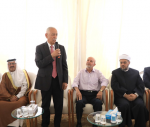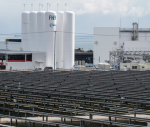You are here
Israel’s Rafah Operation, regional tensions and the US peace efforts
Jun 03,2024 - Last updated at Jun 03,2024
The Israeli operation in Rafah is ongoing, with Israel now having full control over the Rafah border and the Philadelphia Corridor. Through this operation, which indeed marks a new phase in the conflict, Israel is trying to have the upper hand on the course of events in the ground both at the military and intelligence levels, as controlling the border with the Sinai and demolishing alleged tunnels and smuggling routes has been a primary Israeli objective.
Simultaneously, the pressure on Israel is increasing, largely due to the confused US position regarding how to end the war in Gaza or contain the escalation in the region. So far there has been a clear failure on both fronts.
Promoting regional peace as an incentive to stop the war might be an interesting approach, but the level of conflict and issues in the region makes this plan difficult to implement.
After months of international coalition efforts in the Red Sea, the Houthis continue to operate, keeping this front open. At the same time, rockets and drones from Iraq have become more frequent in attacking Eilat, and the front in Lebanon is heating up significantly. With all this broader activity, promoting regional peace may bepremature, as the situation on the ground needs to be contained immediately rather than pushing for a political deal with factions not part of the chaotic situation.
The recognition of a Palestinian state has also become another tool of diplomatic pressure. However, this approachhas not been helpful as the conflict is ongoing, and more concrete solutions are needed on the ground. Recognizing a Palestinian state with no clear identity, geography, or entity is only complicating problems further, it is not satisfying the Palestinians while provoking the Israelis, whose priority today is security and closing open fronts.
On the ground, continuous pressure on Israel has not deterred it from continuing its operations in Rafah. However, it is necessary now to start considering the post-war period. Gaza is undoubtedly a priority, but it is crucial to consider the whole situation as a package. Although it is complicated and difficult to devise a successful plan that can satisfy everyone, it is essential to make the effort.
Arab initiatives to rebrand the Arab Peace Initiative should be seen positively and represent a chance to open a channel for regional stability. However, time is limited for the Biden administration.
While reaching a political deal might be promoted as a diplomatic success, on-the-ground realities may not align with any purported success.
The carrot-and-stick strategy is often considered an efficient diplomatic tool in brokering a deal, however in the case of this American administration, there is a perception that the stick is not feared and the carrot is not tempting.
There are many criticisms of the diplomatic approach taken by this American administration, but it cannot be taken in isolation from previous mistakes and failed approaches toward key players in the region, like the Gulf countries, which still remember the Yemen experience when dealing with the Biden administration.
In summary, while Israel continues its operations in Rafah, the increasing pressure on it, largely due to the US’s confused stance, has not deterred it. It is crucial to think beyond the immediate conflict and consider a comprehensive post-war plan, despite the complexities.
The rebranding of the Arab Peace Initiative is a positive step, but time is running out for the Biden administration to make meaningful progress with a more effective approach.













Add new comment